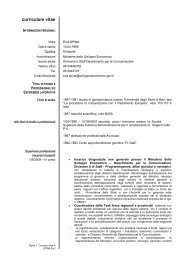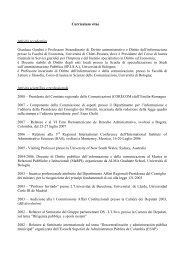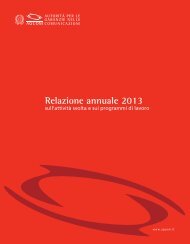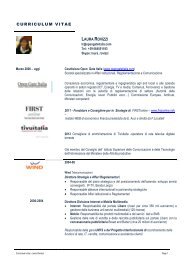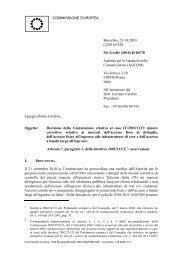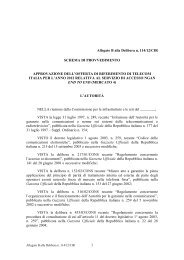Building Competitiveness and Business Performance with ICT
Building Competitiveness and Business Performance with ICT
Building Competitiveness and Business Performance with ICT
- No tags were found...
You also want an ePaper? Increase the reach of your titles
YUMPU automatically turns print PDFs into web optimized ePapers that Google loves.
Real SuccessEuropean policiesdesigned to foster<strong>ICT</strong>-enabledcompetitivenessAs part of this research project, several policyexperts were asked to highlight what theybelieved were the most significant policies in theEuropean Union (EU) that were making it easierfor businesses to create value from mobility,cloud-based services, <strong>and</strong> collaboration tools.What follows is a synthesis of the most popularchoices.Policy makers in Europe are engaged in anumber of efforts that facilitate the use of allthree technologies. Dr. Georg Serentschy, CEOof Telecommunications <strong>and</strong> Postal Services,RTR-GmbH, Austria <strong>and</strong> BEREC Chairman 2012,emphasized “that the European Commissionplays a vital role in fostering the developmentof new technologies <strong>and</strong> in encouragingmember states to make <strong>ICT</strong> one of their policypriorities.” For example, the 7th EU FrameworkProgramme for Research <strong>and</strong> TechnologicalDevelopment dedicates a majority of its funds to<strong>ICT</strong> projects. In doing so, the EU has facilitatedthe creation of new forms of communication<strong>and</strong> collaboration <strong>and</strong> has made progress incloud-based applications <strong>and</strong> storage. Horizon2020, the future research program of the EU,will continue to pick up these topics <strong>and</strong> focuson further development in the field of cloudcomputing.EU policy makers know that European firmscan operate <strong>and</strong> innovate effectively <strong>and</strong>efficiently when infrastructures, such asbroadb<strong>and</strong>, <strong>and</strong> policies related to workingdigitally are harmonized across the region.For example, Amalia Sartori, Italian Member ofthe European Parliament in the Group of theEuropean People’s Party <strong>and</strong> Chairwoman ofthe Industry, Research <strong>and</strong> Energy Committeein the European Parliament, <strong>and</strong> her colleaguesare working to establish a ubiquitous <strong>and</strong>capable infrastructure to be used as aplatform by businesses <strong>and</strong> consumers. SaidSartori, “Our intent is to make high-capacitycommunications, fixed <strong>and</strong> wireless, availableto everyone, everywhere.” To accomplishthis, European policy makers have introduceda series of policies, such as the RoamingRegulation (focused on lowering roamingprices for both voice <strong>and</strong> data across the EU, forall users); the Electronic Signature Regulation(aimed at creating a solid basis of trust forcommerce) as well as regulations related tocyber security <strong>and</strong> electronic services.Several policy experts noted the importanceof the European Union’s Cloud ComputingStrategy, which was presented by Neelie Kroes,Vice President of the European Commission, inSeptember 2012.• Bill Kenard, US Ambassador to the EU <strong>and</strong>former Commissioner of the FCC, said“the Strategy outlines ambitious actionsto ensure a more speedy deployment ofcloud computing in Europe <strong>and</strong> is a goodframework for future action.”• Sabine Verhayen, Member of the EuropeanParliament in the Group of the EuropeanPeople’s Party (Christian Democrats),Germany said the “Strategy will create asingle, seamless space for digital content.It just doesn’t make sense to have a cloudfragmented by 27 sets of rules. The cloudhas huge potential. In Germany alone itis estimated that over the next five yearsthe cloud could generate €200 billion <strong>and</strong>800,000 jobs.”• Mario Valducci, Italian Member ofParliament from People’s Freedom Party<strong>and</strong> Chairman of Transport, Postal <strong>and</strong>Telecommunications Committee at theItalian Chamber of Deputies said creating“a single set of rules for cloud computing,will greatly help businesses throughout theEU succeed. Nearly all business use cloudcomputing, even if they do not realize it.With the new Strategy, businesses shouldnot fear moving data from one cloudprovider to another, something that isregularly cited as a problem.”• Antonio López-Istúriz White, SpanishMember of the European Parliament <strong>and</strong>European People’s Party (EPP) SecretaryGeneral, highlighted a specific aspectof the strategy, the European CloudPartnership (ECP). “The objective of ECPis to stimulate public sector adoption ofcloud computing services in Europe; theECP will bring together public authorities<strong>and</strong> industry consortia to implementpre-commercial procurement activitiesto identify common cloud computingrequirements, to develop specifications forIT procurement <strong>and</strong> to procure referenceimplementations. Cloud uptake is essentialfor Europe both economically, in terms ofdriving digital growth for Europe, as well asallowing Europe to remain competitive onthe global stage <strong>and</strong> socially, as it allowsend-users to access innovative services.Recent research has modeled job growthassociated <strong>with</strong> adoption of cloud-basedservices in several countries. 4Another important area where European policymakers have succeeded coordinating efforts<strong>and</strong> resources to help businesses <strong>and</strong> citizenis in the area of skills. As Sabine Verhayennoted, “Without a high level of digital literacywe will not be able to reap the benefits of thedigital age in Europe nor will we achieve theinclusive society. The EU has a goal then tomake ‘every European digital’ by 2020. Onlyby taking action can we remove the forecastedshortfall of 700,000 <strong>ICT</strong> professionals in Europein 2015.” This topic is discussed further in KeyImplications for Policy Makers.Although it is ultimately the responsibilityof firms to develop key business enablers<strong>and</strong> figure out how best to reap the rewardsfrom their <strong>ICT</strong> investments to enhance theircompetitiveness, policy makers have animportant role to play in promoting the digitalagenda. Said Amalia Sartori, “It is of coursea matter for business to develop attractiveservices <strong>and</strong> content. The role of EU policyshould be to create an even playing field,allowing a wide variety of competing offerings,<strong>and</strong> to avoid unnecessary restrictive rules.However, it’s not necessarily our task to gofurther by adapting policies to either favour orhinder particular business models such as cloudcomputing. The development of offerings <strong>and</strong>their take-up will be decided by the mechanismof supply <strong>and</strong> dem<strong>and</strong> on the marketplace.”Research results in this report confirm thismarket approach, that firms will have theopportunity to develop business modelsdriven by their particular <strong>ICT</strong> investments <strong>and</strong>strengthened by the business enablers that areappropriate for them.4 For employment effects of cloud adoption, seealso report developed by Jonathan Liebenau, PatrikKarreberg, Alex<strong>and</strong>er Grous <strong>and</strong> Daniel Castro. (2012).“Modelling the Cloud: Employment effect in twoexemplary sectors in the United States, the UnitedKingdom, Germany <strong>and</strong> Italy.” LSE-Enterprise, thebusiness services <strong>and</strong> knowledge transfer unit of theLondon School of Economics.<strong>Building</strong> <strong>Business</strong> <strong>Performance</strong> <strong>and</strong> <strong>Competitiveness</strong> <strong>with</strong> <strong>ICT</strong>9





